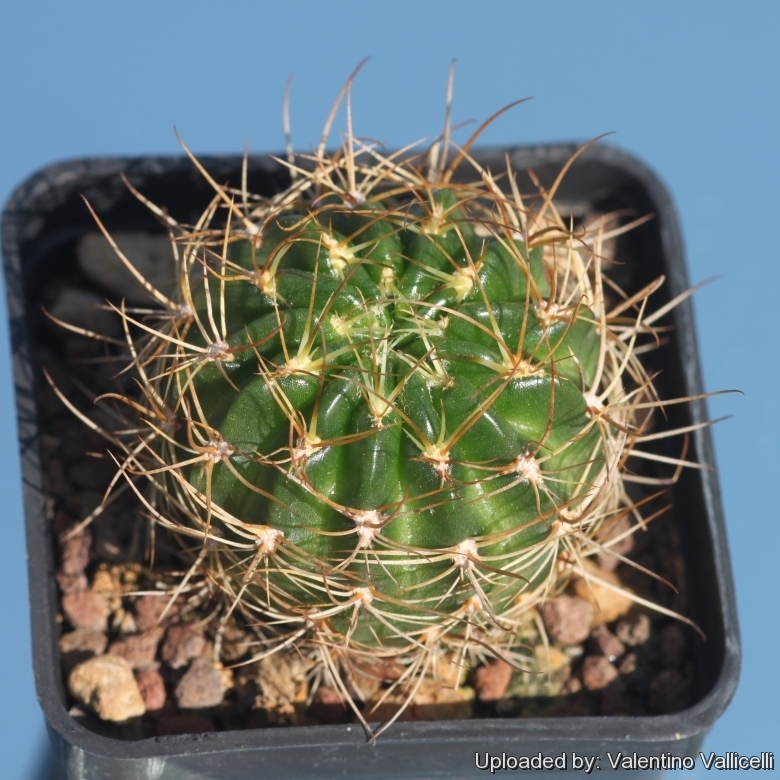Accepted Scientific Name: Echinopsis schieliana (Backeb.) D.R.Hunt
Bradleya 5: 92 (1987)

Echinopsis schieliana subs. leptacantha Photo by: Valentino Vallicelli
Juvenile specimen.
Origin and Habitat: Paucartambo, Peru.
Altitude range: 2800-3050(-3750) metres above sea level.
Synonyms:
See all synonyms of Echinopsis schieliana
back
Accepted name in llifle Database:Echinopsis schieliana (Backeb.) D.R.HuntBradleya 5: 92 (1987)Synonymy: 16
back
Description: Echinopsis schielianaSN|15861]]SN|15861]] subs. leptacantha, formerly known as Lobivia leptacanthaSN|15870]]SN|15870]], is one of the forms of Echinopsis schielianaSN|15861]]SN|15861]] which is a widespread and morphologically variable taxon. It is a small globular cactus distinguished from the type species for its straight ribs with mostly long soft spines and yellow, red or purple double sized flower, but most botanist agree on the fact that all the varieties described until now should all be included in the Echinopsis schielianaSN|15861]]SN|15861]]. Flowers appear most heavily in spring and summer. Echinopsis schielianaSN|15861]]SN|15861]] subs. leptacantha belongs to a group of very easily cultivated plants, decorative with pleasing appearance of stem and flower alike.
Stems: Bright green.
Spines: Long soft brownish-yellow.
Flowers: Larger than Echinopsis schielianaSN|15861]]SN|15861]] somewhat variable, 4 or more cm in diameter. Inner perianth segments reddish-orange, yellowish-orange or yellow.
Subspecies, varieties, forms and cultivars of plants belonging to the Echinopsis schieliana group
Bibliography: Major references and further lectures
1) Clive Innes “Complete Handbook of Cacti and Succulents” Van Nostrand Reinhold Company, 01 December 1981
2) Walter Rausch “Lobivia: The Day Flowering Echinopsidinae from a Geographical Distribution Point of View” Volumes 1-3 R. Herzig, 1975
Cultivation and Propagation: Echinopsis schielianaSN|15861]]SN|15861]] subs. leptacantha is a good beginner cactus and easy to grow and flower. It is quite resistant and occasionally gets covered by bright showy blossoms also neglected in a dry windowsill. Requires good drainage and very porous potting mix. Watering Needs Need regular water in spring to fall but do not water again until dry. Also, it is a species that is dormant in the winter and require very little water (maybe even none) during the cold months.
Frost Tolerance: Light frost protection required. Minimum of 5ºC for safe growing (but hardy up to -5°C or less). Requires to be kept below 7°C in winter to flower well in the spring.
Sun Exposure: Requires bright light (protect from strong midday sun). In shade the body colour will remain mostly green, while full sun will darken it and give it red/brown body colour. Can be sunburned if moved from shade/greenhouse into full sun too quickly. The amount of sunlight it can withstand without scorching depends upon the how hot it becomes in the summer in the locale in which it is planted. It will have more colour if it receives more light. During the spring it may be able to take full sun until the heat arrives at the end of spring. In an area that has hot afternoon sun, it may be able to take full morning sun, but requires afternoon shade or afternoon light shade.










